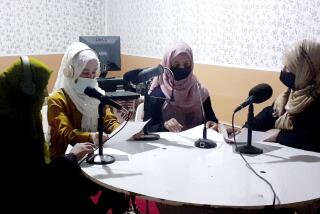Radio Sawa Deserves a Better Hearing Than This
The report by the State Department’s Advisory Group on Public Diplomacy for the Arab and Muslim World in October was supposed to offer suggestions for how the United States could improve its ailing image in the Arab world. But the report foolishly criticized one of the most successful, innovative programs operating today, the new U.S. government-sponsored Radio Sawa.
Radio Sawa is a 24-hour, seven-day-a-week Arabic-language network broadcasting an impressive mix of programming: balanced and up-to-the minute news and analysis, the best Western and Arabic pop music, and “news-magazine” style interviews, opinion pieces, sports and features on a wide variety of political, social and cultural issues.
In July and August, AC Nielsen surveyed five countries where Sawa is broadcasting. The results were astonishing, demonstrating that Sawa is getting through.
Sawa has an average audience of 32% of the general population ages 15 years and older. It has a relatively weak signal in Egypt and only gathers 11% of the market there, but it earns 30% to 41% in each of the other markets surveyed: Jordan, Kuwait, Qatar and the United Arab Emirates. In those four countries, it has achieved market dominance -- an average 42% -- in the 15-to-29 age group, considered the most important target in the war for hearts and minds.
So what’s the commission’s problem with a program that is obviously a stunning success? It thinks Sawa is too focused on building an audience instead of trying to change opinions. It recommends a different kind of public diplomacy -- establishing an American-sponsored study center or university programs or libraries. But you don’t have to be a media mogul to know that if you want to persuade people to be sympathetic to the United States, the first thing to do is expand your market share.
The report says “any listener to a U.S.-sponsored station is likely to be favorably disposed to the United States” already. But Sawa is reaching far beyond the pro-American community in most countries. And unlike a library, it doesn’t have to wait for people to walk through its door. In countries with notoriously low literacy, the medium of radio is invaluable.
In June, the Pew Global Attitudes Project found in Jordan that those who had a favorable view of the United States had sunk to a disturbing 1%. Yet the Nielsen survey showed that 30% of Jordanians were listening to Sawa and a whopping 51% of the elite was tuning in.
The commission itself cited a 2002 survey that found only 6% of Egyptians viewed the U.S. favorably, but even with its weak signal to Egypt, Radio Sawa had that 11% market share. In Qatar, home of Al Jazeera, where shortly before the Iraq war most people viewed the U.S. as a bigger threat than Iraq by a 2-1 ratio, Radio Sawa owned a 41% share of the market.
The commission calls for “candor and confidence, not spin and sugar-coating” in public diplomacy. But that’s exactly what Radio Sawa does. And reporting the news in a fair and balanced manner is itself a way of improving attitudes.
The only way to clearly assess changing attitudes is to do it over time. Regarding its own recommended programs, the commission insists it will take time to see positive effects. Yet when it comes to the fledgling Radio Sawa, it forgets its own advice.
Not surprisingly, given these views, the commission is unenthusiastic about the planned TV equivalent of Sawa, Middle East Television Network, a creative American answer to Al Jazeera. Instead, it calls for a nonprofit U.S. Corp. for Public Diplomacy, modeled on the domestic Corp. for Public Broadcasting.
This idea is a Mideast media fantasy. It is inconceivable in the current climate that programs prepared in the United States, especially by a government-sponsored entity, would receive an airing, let alone a fair airing, on local Arab networks.
The commission is right that we need to sharpen our efforts with the region’s elite, but it’s wrong to ignore a broader audience. The Sawa experience proves that if you provide services creatively and helpfully, you will succeed if you’re in for the long haul. Our security demands that we do nothing less.
More to Read
Sign up for Essential California
The most important California stories and recommendations in your inbox every morning.
You may occasionally receive promotional content from the Los Angeles Times.








